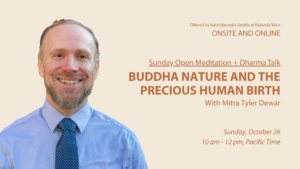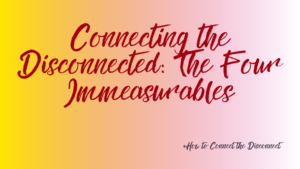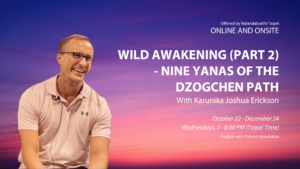What is the connection between the indestructible nature of mind pointed out in Vajrayana Buddhism, vulnerability and the practice of self-kindness?
The quintessential symbol of Vajrayana Buddhism, the vajra, represents the indestructible nature of your own mind. It is said to be indestructible because mind is present in every moment of experience without needing to be generated or defended. It is not a solid, identifiable thing, but it appears in a variety of dynamic expressions. It is, in the deepest sense, who or what we truly are.
Most of the time we do not recognize ourselves as this beautiful, spacious nature. Instead, we see only our idea of who we think we are: our ego.
Ego itself is just like a daydream: no big deal. It is just another concept, belief or thought. But, we cling so tightly to it, and that creates problems. Instead of being open to the dynamic play of experience, the ego-clinging mind tries to make everything fit its expectations and storyline. The ego is constantly telling a story about the world and its place in it. Rather than be curious about this story and whether it is authentic or not, we believe it without question and are upset when the world doesn’t follow along. This unrealistic approach to life breeds fear and defensiveness as we struggle to make an ever-changing reality fit our impossibly rigid expectations.
Vulnerability is when we relax the ego-clinging mind. Vulnerability, and the openness it brings, allows us to be present for both victory and defeat, pleasure and pain, without taking any of these on as our identity. We come to see these as natural consequences of engaging with life that are not to be feared or shunned. In her book, Daring Greatly, Brené Brown writes, “Vulnerability sounds like truth and feels like courage.” With the courage to let go of our fear and resistance, we can relate openly with the true, dynamic flow of life’s experience. It may seem we have accomplished something, but we are just relaxing into our indestructible nature.
One method for strengthening our courage to relax with vulnerability is to practice loving-kindness: a tender, open and all-accepting attitude. It is the practice of meeting each moment, each experience, with gentleness. Loving-kindness for oneself invites us to drop our fear, perfectionism and defensiveness, and just be without judgment.
Exercise
Try this exercise from the Buddhist tradition. With practice, you might find yourself becoming more comfortable being courageously vulnerable:
Step 1: Be still. Focus on your present body and mind. Take a few deep breaths.
Step 2: Generate a thought of loving-kindness towards yourself. You may use images that help to open your heart or repeat words or phrases like “love” or “I am worthy of acceptance.” Placing your hand on your heart often helps. It is okay if you don’t feel anything at this stage. Generate thoughts of loving-kindness and, with time and practice, the feeling will follow.
Step 3: Once you feel some sense of warmth, tenderness, confidence and acceptance of yourself, then just relax and be present with that. Without thinking, see if you can feel the sensations in your body. Rest in transparent openness like a clear blue sky.
Step 4: End the practice by once again generating an attitude of loving-kindness towards yourself and then extend that feeling out towards all beings, wishing that they, too, may experience this love and acceptance. From time-to-time throughout your day, remember this attitude and feeling of loving-kindness.

Ben Mikolaj has been a student of Dzogchen Ponlop Rinpoche since 2009 and currently serves as COO of Nalandabodhi International. Ben enjoys traveling, reading, hiking, jokes, the mysterious, musical theater, and movies. Ben can often be found hiking in the mountains of Colorado with his wife and their dog Kraken






